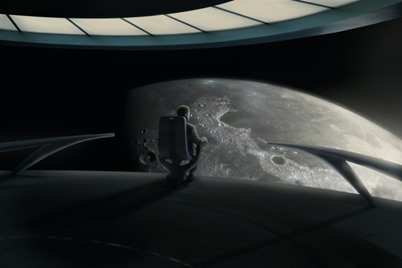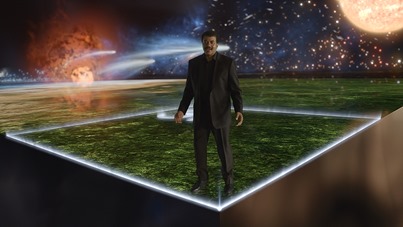Cosmos: A Spacetime Odyssey (Fox, Sundays, 9/8C) is, essentially, a reboot of the PBS series in which Carl Sagan gave millions of viewers an understanding of science and what it means for us in the real world. The new series, written by Ann Druyan – who was part of the original series more than thirty years ago – has, potentially, a much larger opportunity to have an impact thanks to Seth MacFarlane (yes, the Family Guy guy) and host, astrophysicist Neil deGrasse Tyson (1.7 million Twitter followers!).
The premiere episode, Standing Up in the Milky Way, explores the origins of the universe, the solar system, Earth and humanity. To do so, Tyson invites to join him on the Ship of Imagination – the ultimate space/time exploration vessel, likely inspired by the various iterations of Star Trek’s U.S.S. Enterprise (Trek Veteran Brannon Braga is involved in the series and directed the premiere).
From the start, the series utilizes animation (CG and hand drawn) to take us through time and space to view the birth of the universe and write our address within that universe. Tyson makes a terrific host – he knows his stuff and, as a result, the ideas and stories he communicates feel right. When he describes the existence of the universe, from its birth to the present as a one-year calendar – and notes that recorded history covers only the last few seconds that year – it not only fits the science, it has the ring of truth.
At one point, Tyson describes science as ‘an adventure with thousands of heroes,’ and the in the premiere, one of those heroes’ stories is told – Giordano Bruno, who became convinced that Earth was not only not the center of the universe, but a planet orbiting the sun in a universe of suns, each with their own planets. He paid for his vision of the universe with his life. Ten years after his death, Galileo took a look through a telescope and proved him right.
Tyson even brings Carl Sagan into the story – and it’s a big part of Cosmos: A Spacetime Odyssey that science is also an ongoing story – through his remembrance of a day that he spent with the late scientist, as a seventeen-year old, noting that Sagan inspired him not just to be a scientist but a good person.
Like the original Cosmos, this reboot makes it clear that science is a part of our lives and that it should be embraced. It takes concepts and explains them in plain English and makes them accessible to everyone – an interesting idea in a world in which there can be climate change deniers and a scientist who has more Twitter followers than a lot pop culture icons. It makes science personal.
Try it. You’ll like it.
Final Grade: A
Photos courtesy of Fox

